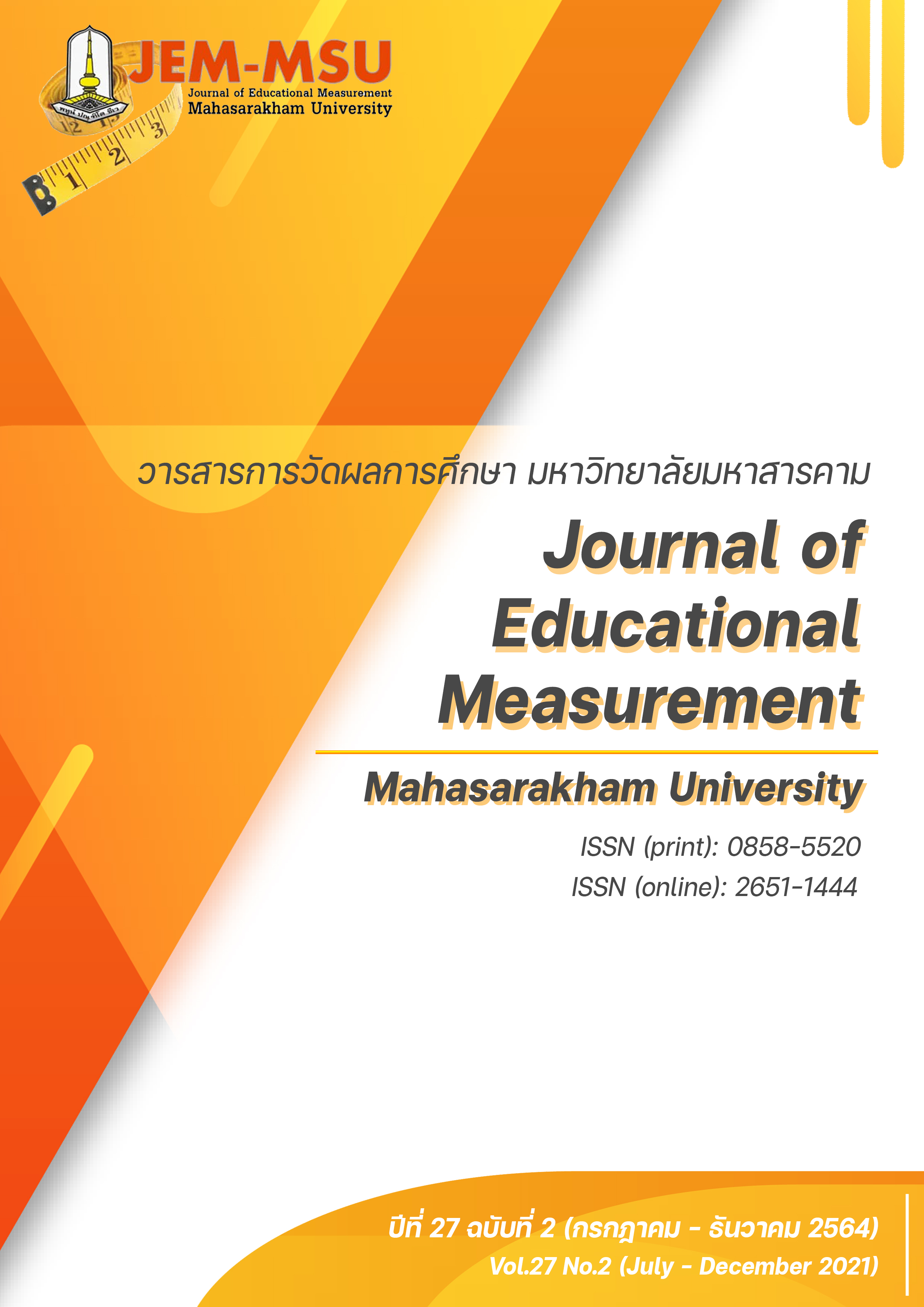A Participatory Model in Virtue and Ethic Promotion for Early Childhood Children in Schools under Buriram Primary Education Service Area Offices
Main Article Content
Abstract
This research aimed to 1) study the components of virtues and ethics for early childhood children, 2) investigate participation in virtue and ethic promotion for early childhood children, 3) construct and develop a participatory model in virtue and ethic promotion for early childhood children in schools under Buriram Primary Education Service Area Offices, and 4) evaluate the participatory model in virtue and ethic promotion for early childhood children. The research design was divided into 4 stages:1) studying the components of virtues and ethics for early childhood children; 2) studying the participation in virtue and ethic promotion for early childhood children, 3) constructing and developing the participatory model in virtue and ethic promotion for early childhood children in schools under Buriram Primary Education Service Area Offices; and 4) evaluating the participatory model in virtue and ethic promotion for early childhood children. The target group consisted of 3 school administrators, 6 early childhood education teachers, 12 parents of early childhood children, and 9 basic education institution committee members and community leaders, totaling 30, from 3 outstanding schools with royal award of virtue and ethic promotion: Ban Nongyaplong School, Ban Nongkarako School, and Anuban Lamplaimat School. The research instruments were 4 sets of in-depth interview guides, observation forms, and an expert’s evaluation form. The collected data were analyzed by using frequency, percentage, the mean, standard deviation and content analysis technique.The findings can be summarized as follows:
1. The virtues and ethics for early childhood children consisted of 8 components, namely honesty, kindness, discipline, economizing and saving, gratitude, sufficiency, courteousness, and having voluntary mind.
2. The participation in virtue and ethic promotion for early childhood children was of 2 facets: participation and processes of participation. The participation was divided into direct participation and indirect participation. While the process of participation was composed of 4 steps: brainstorming and planning, taking action, monitoring, and sharing mutual benefits.
3. The participatory model in virtue and ethic promotion for early childhood children in schools under Buriram Primary Education Service Area Offices incorporated more direct participation than indirect participation. Meanwhile, the process of brainstorming and planning were found most, followed by taking action, monitoring and sharing mutual benefits, respectively.
4. The participatory model in virtue and ethic promotion for early childhood children in schools under Buriram Primary Education Service Area Offices was evaluated and confirmed by 21 experts for correctness, appropriateness, and possibility. It was found that, on the whole, the results were at the high level. When considered by aspect, it was found that the correctness was at the highest level while the appropriateness and possibility were at the high level.
Article Details
The content and information contained in the published article in the Journal of Educational Measurement Mahasarakham University represent the opinions and responsibilities of the authors directly. The editorial board of the journal is not necessarily in agreement with or responsible for any of the content.
The articles, data, content, images, etc. that have been published in the Journal of Educational Measurement Mahasarakham University are copyrighted by the journal. If any individual or organization wishes to reproduce or perform any actions involving the entirety or any part of the content, they must obtain written permission from the Journal of Educational Measurement Mahasarakham University.
References
กุลยา ตันติผลาชีวะ. (2544). ครูกับการศึกษา. กรุงเทพ: มหาวิทยาลัยศรีนครินวิโรฒ.
เฉลา บ้วนหลี. (2558 ). ผลการจัดประสบการณ์การเรียนรู้บูรณาการหลักเศรษฐกิจพอเพียงที่มีต่อพฤติกรรมความมีวินัยในตนเองของเด็กปฐมวัย. วิทยานิพนธ์ครุศาสตรมหาบัณฑิต มหาวิทยาลัยราชภัฏนครสวรรค์.
นายิกา จันทร์ยิหวา. (2560). รูปแบบการส่งเสริมจริยธรรมนักเรียนในสถานศึกษาขันพืนฐานสังกัดสำนักงานเขตพื้นที่การศึกษาประถมศึกษานราธิวาส เขต 1. วารสารวิจัยทางการศึกษา คณะศึกษาศาสตร์ มหาวิทยาลัยศรีนครินทรวิโรฒ, 11(2), 51-70.
นัยนา นาคะสิงห์. (2554). โครงการดูงานโรงเรียนในฝัน. ยะลา: สำนักงานเขตพื้นที่การศึกษาประถมศึกษายะลา เขต 2.
นวนละออง หงษ์ภู. (2552). การพัฒนาแบบวัดคุณธรรมจริยธรรมและคุณลักษณะที่พึงประสงค์สำหรับเด็กปฐมวัยในโรงเรียนสังกัดสำนักงานเขตหลักสี่ กรุงเทพมหานคร. สาขาหลักสูตรและการสอน: มหาวิทยาลัยเกษตรศาสตร์.
บุญชม ศรีสะอาด. (2556). การวิจัยเบื้องต้น. พิมพ์ครั้งที่ 9. กรุงเทพฯ: สุรีวิทยาสาสน์.
ปิยนันท์ แซ่จิว. (2560). การพัฒนาหลักสูตรการบริหารจัดการงานวิชาการศูนย์พัฒนาเด็กเล็กสังกัดองค์กร ปกครอง ส่วนท้องถิ่นในภาคตะวันออกเฉียงเหนือไทย.วิทยานิพนธ์ ปร.ด. (การบริหารการศึกษา), บัณฑิตวิทยาลัยมหาลัยราชภัฏบุรีรัมย์.
พระสมุห์ประสิทธิ์ ปสิทฺธิโก (แสนด้วง). (2560). การส่งเสริมคุณธรรมและจริยธรรมในสถานศึกษา สังกัดสำนักงานเขตพื้นที่การศึกษาประถมศึกษาอุบลราชธานี เขต 2. วิทยานิพนธ์พุทธศาตรมหาบัณฑิต สาขาวิชาการบริหารการศึกษา มหาวิทยาลัยมหาจุฬาลงกรณราชวิทยาลัย
เมตต์ เมตต์การุณจิต. (2553). การบริหารการศึกษาแบบมีส่วนร่วม: ประชาชนองค์กรการปกครองส่วนท้องถิ่นและราชการ. พิมพ์ครั้งที่ 3. กรุงเทพฯ: บุ๊คพลอยท์
วิมลลักษณ์ ตีระมาศวณิช. (2558). แนวดำเนินการการมีส่วนร่วมของผู้ปกครองในการพัฒนาคุณธรรม จริยธรรมของเด็กปฐมวัย. วิทยานิพนธ์ ครุศาสตรดุษฎีบัณทิต สาขาวิชา การบริหารการศึกษามหาวิทยาลัยราชภัฏอุบลราชธานี.
สิริมาศ กาญจนโอภาส. (2557). การสร้างกิจกรรมศิลปสร้างสรรค์ ตามแนวปรัชญาเศรษฐกิจพอเพียงของเด็กปฐมวัย ระดับชั้นอนุบาลปีที่ 2. ปริญญานิพนธ์ มหาวิทยาลัยศรีนครินทรวิโรฒ.
สำนักงานคณะกรรมการการศึกษาขั้นพื้นฐาน กระทรวงศึกษาธิการ. (2560). หลักสูตรสถานศึกษาปฐมวัย พุทธศักราช 2560. พิมพ์ครั้งที่ 1. กรุงเทพฯ : ชุมนุมสหกรณ์การเกษตรแห่งประเทศไทย.
สำนักงานคณะกรรมการการศึกษาแห่งชาติ. (2545). มาตรฐานสำนักงานเขตพื้นที่การศึกษา. กรุงเทพฯ: สำนักงานคณะกรรมการการศึกษาขั้นพื้นฐาน.
สำนักงานเลขาธิการสภาการศึกษา. (2554). การพัฒนารูปแบบสมัชชาการศึกษาเพื่อส่งเสริมการมีส่วนร่วมของประชาชน.กรุงเทพฯ : สกายบล็อกและการพิมพ์.
สำรวย เรืองศรีมั่น. (2557). การศึกษาสภาพปัญหาและแนวทางการส่งเสริมคุณธรรมเด็กปฐมวัย. วิทยานพนธ์ครุศาสตรมหาบัณฑิต มหาวิทยาลัยราชภัฏกาฬสินธุ์.
Erikson, W.(1996).Participation Management: Concepts, Theory and Implementation. Atlanta, GA :Georgia State University.
Office of the Non-Formal and Informal Education (NFE). (2014). 12 core values of Thai people according to the NCPO policy. Available from: https://www.moe.go.th/ moe/th/news/detail.php. (Accessed 14 October 2019).


